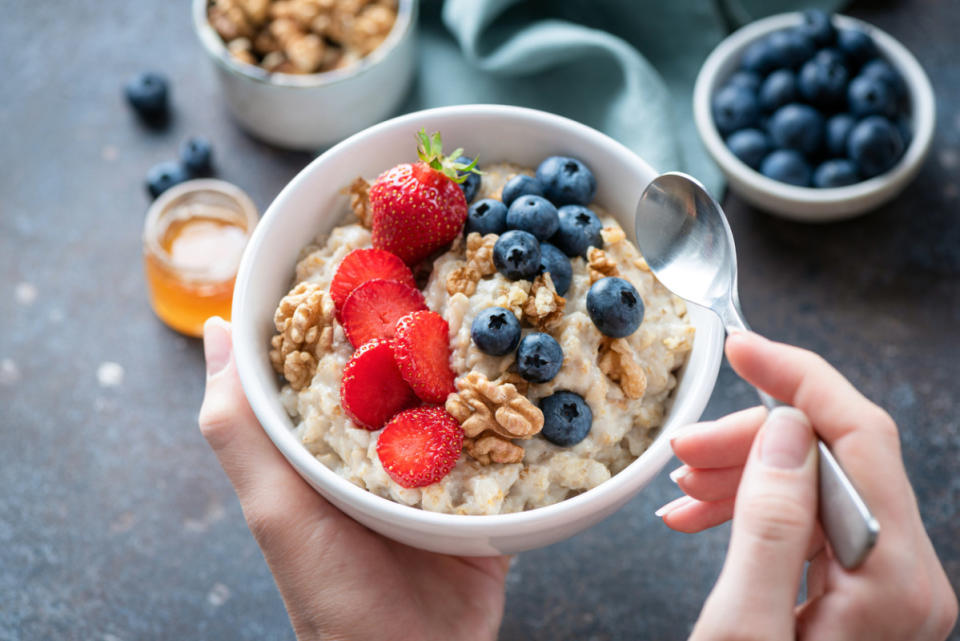Wait, What's the Difference Between Rolled Oats and Quick Oats?

Rolled oats
Oats are the foundation of one of the most beloved breakfast foods out there: a hearty bowl of oatmeal. And while there is a wide world of oats out there, rolled outs and quick oats are two varieties that you'll likely use most often, but do you know the difference between the two?
To help us sort out this question, we gave the whole grain experts at Bob's Red Mill a call. We chatted with Sharena Shasteen, Bob Red Mill’s Culinary Content Strategist, to help us get a clear answer to our question. Here's everything you need to know about the difference between rolled oats and quick oats, the best uses for each and more.
Related: I'm a Food Editor—Here's How I Make The Perfect Bowl of Oatmeal Every Morning
What Are Oats?
Before we dig a little deeper, let's start at the start. Oats are a type of cereal grain. Both rolled oats and quick oats are made from the edible seeds of oat plants, which are called groats. The difference between rolled oats and quick oats primarily comes down to the way that each is processed.
Related: 19 Oat-rageous Oat Recipes
What Are Rolled Oats?
Both rolled oats and quick oats undergo steaming, but “rolled oats are steamed for a shorter period of time,” Shasteen explained. After being steamed, they’re pressed (aka rolled) using a mill, which is how they get their signature oval shape. Rolled oats, which are also known as old-fashioned oats, are “typically larger and thicker” than quick oats, and “have a chewier texture,” said Sharena.
Because rolled oats are thicker they’re better able to retain their toothsome texture when cooked. When it comes to making overnight oats, rolled oats are definitely the way to go because they won’t turn to mush while they're chilling in the fridge.
Related: The Easiest Instant Pot Oatmeal
What Are Quick Oats?
Quick oats are steamed like rolled oats, but instead of being only partially cooked, they are cooked all the way through. They are also “rolled thinner in order to cook faster and can be prepared in half the time,” says Shasteen. Because quick oats have already been cooked all the way through, they don’t retain their chewy texture the way rolled oats do, but “they are the perfect texture for thick, creamy oatmeal,” according to Shasteen.
Related: 22 Oatmeal Cookies Recipes That Outshine Chocolate Chip

iStock
How Long Does it Take to Cook Rolled Oats vs. Quick Oats
As you might expect, quick oats cook more quickly than rolled oats. Generally speaking, rolled oats will take about 10 to 20 minutes to cook on the stovetop, while quick-cooking oats can be done in 1 to 5 minutes. Keep in mind that instant oats are an entirely different category and cook even more quickly. Sometimes all you have to add is boiling water.
Are There Any Nutritional Differences Between Rolled Oats and Quick Oats?
I asked Shasteen if rolled oats or quick oats had more nutritional value, but they come out pretty much equal. “There are no significant nutritional differences in the two types of oats. The only noteworthy nutritional difference is that “quick-cooking oats have a slightly higher GI level,” she said. This means that they can raise your blood sugar slightly quicker because of their smaller grain size.” Otherwise, rolled oats and quick oats are completely the same from a nutritional standpoint.
Best Uses for Rolled Oats and Quick Oats
When it comes to making oatmeal, you can use either one of these oats. If you prefer a bit of chewiness, use rolled oats. If a smoother, creamier bowl of oatmeal is your thing, then you should opt for quick oats. And just another reminder, that for non-mushy overnight oats, you’ll definitely want to go with rolled oats.
When it comes to baking, these two oats can be used interchangeably if needed. However, “rolled oats are typically better because they retain their texture better than quick oats,” said Shasteen. If you don’t want the texture of the oatmeal in your baked goods, then quick oats might be the better choice for you. Baking nerd alert: If you’re going to substitute one for the other in a baking project, you should go by volume instead of by weight because rolled oats tend to weigh a tiny bit more than quick oats.
Up next: The #1 Change I Noticed When I Ate a Bowl of Oatmeal for Breakfast Every Day for a Week

